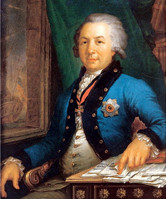
Gavriil Derzhavin, Russian poet, first governor of Olonets, President of Collegium of Commerce, Minister of Justice was born
“I have erected for myself a monument wondrous, eternal,
It is firmer than metal and taller than the pyramids;
Neither whirlwind nor fleet-moving thunder can break it,
And time’s flight cannot destroy it”.
Gavriil Derzhavin, “Monument” (1795)
On July 3 (14), 1743 near Kazan in a not wealthy noble family was born Gavriil (Gavrila) Romanovich Derzhavin, Russian poet and statesman; first governor of Olonets (1784), governor of Tambov governorate (1785-1788), secretary of Empress Catherine II (1791-1793), President of Collegium (College) of Commerce (1794), Minister of Justice (1802-1803); member of the Russian Academy, and the State Council of the Russian Empire (1802).
After father’s death in 1754 Derzhavin’s family found itself in a desperate financial situation, however it didn’t prevent his mother from giving education to her sons. Gavriil had private lessons, and later on in 1759 he entered Kazan gymnasium, but three years after he was called up for military service. He enlisted as a private to Preobrazhensky Guard Regiment, and took part in the Palace Revolution of June 28 (July 9) 1762, which enabled Catherine II to ascend the throne.
After 10 years of military service as a soldier Derzhavin was promoted to officer and as a member of private commission of inquiry in 1773-1774 he took an active part in suppression of Yemelyan Pugachev’s Rebellion. Right then he started translating odes by Frederick II of Prussia and writing his own, which came out two years later titled “Odes translated and composed near Mount Chitalagai”. His works were at that time greatly influenced by Russian poets M. V. Lomonosov and A. P. Sumarokov.
In 1777 under the patronage of Prince A. A. Vyazemsky Derzhavin was appointed as executor to the Senate, while in 1782 he attained the rank of the Councilor of State. In the late 1770s there was a serious change in Derzhvin-poet. He was gradually shifting from classical canons eager to find his own artistic method. “The Ode on the death of Prince Meshchersky” (1779) was a milestone in his poet career, while the Ode “Felitsa” (1782) brought him the glory of one of the first poets of Russia. After writing the ode, which praised Empress Catherine II, Derzhavin rose to the rank of Actual Councilor of State.
In 1784 the conflict between Derzhavin and the high-ranking patron Prosecutor-General Vyazemsky forced him to leave his service in the Senate. Nevertheless soon by the decree of the Empress he was appointed governor of Olonets governorate established on May 22 (June 2) 1784. Less than in a year due to disagreements with local authorities Derzhavin was moved to Tambov governorate. At the head of the governorate Derzhavin was trying to fight corruption, what provoked new conflicts. In 1789 he returned back to St. Petersburg and was appointed as a secretary of Catherine II. His duties among others included control over Senate’s papers. Later Derzhavin rose to the post of Senator, and in 1794 — President of Collegium (College) of Commerce. During these years he created famous odes “God” (1784), “Let the thunder of victory sound!” (1791), an unofficial Russian anthem, “The Grandee” (1794), and “Waterfall” (1798).
In 1790 Derzhavin in his works turned to the anacreontic poetry, which glorified earthly life. In 1804 he published his collected works “Anacreontic Songs”, which included works filled with epicurean attitude to the world.
During the reign of Emperors Paul I and Alexander I Derzhavin was actively involved in the life of the state, and occupied senior administrative posts: head of the Senate’s Office, state treasurer and Minister of Justice. In 1803 he retired to his estate called Zvanka in Novgorod governorate where he continued writing literary works and compiled his own collected works. At that time Derzhavin was a member of “Lovers of the Russian Word” literary society, which strongly supported preservation of archaic Russian language and style. However the poet was one of the first to discover the talent of young Alexander Pushkin, whose poems he heard during the exam at the Imperial Lyceum in Tsarskoye Selo in January 1815.
Gavriil Romanovich Derzhavin passed away on July 8 (20) 1816 in his estate Zvanka, Novgorod governorate, and was buried in Khutyn Monastery of Saviour's Transfiguration and of St. Varlaam near Veliky Novgorod.
Лит.: Брилиант С. М. Г. Р. Державин: Его жизнь, литературная деятельность и служба: Биографический очерк. СПб., 1893; Глинка Н. И. Державин в Петербурге. Л., 1985; Грот Я. К. Жизнь Державина по его сочинениям и письмам и по историческим документам. СПб., 1880; То же [Электронный ресурс]. URL: ttp://imwerden.de/pdf/derzhavin_pss_tom8_zhizn_derzhavina.pdf; Дальний Б., Богданов Б. Державин в Тамбове. Тамбов, 1947; Иконников В. С. Г. Р. Державин в своей государственной и общественной деятельности. Пг.; Киев, 1917; Левенштейн О. Г. Г. Р. Державин: Государственная деятельность, 1784-1796 гг. Йошкар-Ола, 1997; Мещеряков Ю. В. Гавриил Романович Державин: тамбовский период деятельности (1786-1788). Тамбов, 2006; Михайлов О. Н. Державин. М., 1977; Обрезкова А. П. Г. Р. Державин — поэт и генерал, первый министр юстиции России. Казань, 2003; Салиас де Турнемир Е. А. Г. Р. Державин — правитель Тамбовского наместничества. Тамбов, 1871; Фирсов Н. Н. Державин как выразитель настроения российского дворянства // Известия Северо-восточного архангельского института в Казани. 1920. Т. I; Эпштейн Е. М., Теплинский М. В. Обзор материалов о пребывании Г. Р. Державина в Карелии // Известия Карело-финского филиала АН СССР. 1951. № 2.
Works: Записки. 1743-1812. М., 2000; Описание торжества бывшего по случаю взятия города Измаила в доме генерал-фельдмаршала князя Потёмкина-Таврического, близ конной Гвардии, в присутствии императрицы Екатерины II, 1791 года 28 апреля // Державин Г. Р. Сочинения. Ч. 4. СПб., 1808. С. 22—60; То же [Электронный ресурс]. URL: http://memoirs.ru/texts/Derz_Opis808.htm; Сочинения Державина с объяснительными примечаниями Я. Грота. Т. 1-9. СПб., 1864-1883.
Based on the Presidential Library’s materials:

